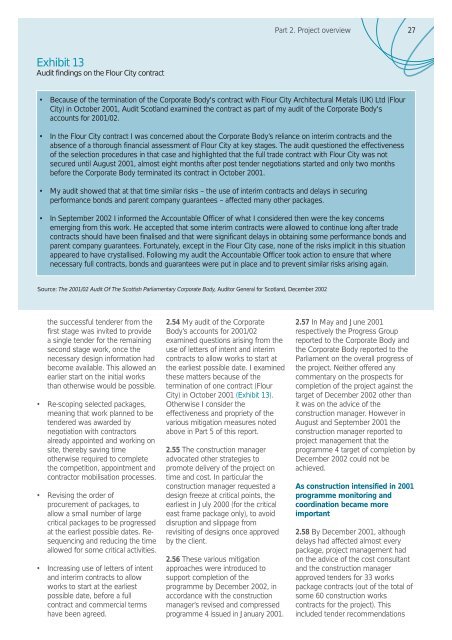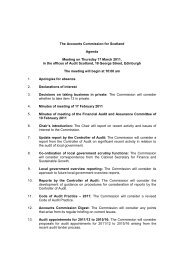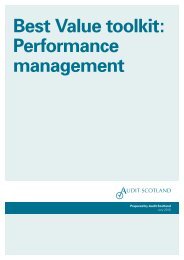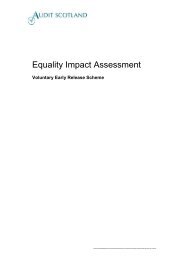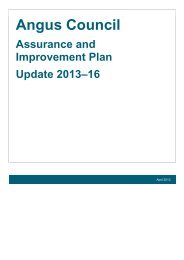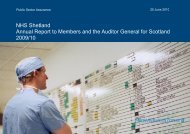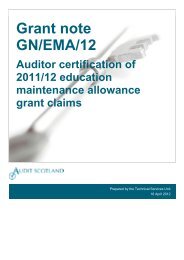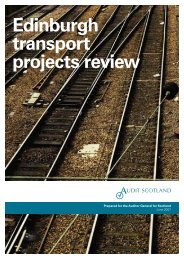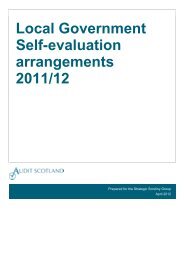Management of the Holyrood building project (PDF ... - Audit Scotland
Management of the Holyrood building project (PDF ... - Audit Scotland
Management of the Holyrood building project (PDF ... - Audit Scotland
You also want an ePaper? Increase the reach of your titles
YUMPU automatically turns print PDFs into web optimized ePapers that Google loves.
Exhibit 13<br />
<strong>Audit</strong> findings on <strong>the</strong> Flour City contract<br />
2.54 My audit <strong>of</strong> <strong>the</strong> Corporate<br />
Body’s accounts for 2001/02<br />
examined questions arising from <strong>the</strong><br />
use <strong>of</strong> letters <strong>of</strong> intent and interim<br />
contracts to allow works to start at<br />
<strong>the</strong> earliest possible date. I examined<br />
<strong>the</strong>se matters because <strong>of</strong> <strong>the</strong><br />
termination <strong>of</strong> one contract (Flour<br />
City) in October 2001 (Exhibit 13).<br />
O<strong>the</strong>rwise I consider <strong>the</strong><br />
effectiveness and propriety <strong>of</strong> <strong>the</strong><br />
various mitigation measures noted<br />
above in Part 5 <strong>of</strong> this report.<br />
2.55 The construction manager<br />
advocated o<strong>the</strong>r strategies to<br />
promote delivery <strong>of</strong> <strong>the</strong> <strong>project</strong> on<br />
time and cost. In particular <strong>the</strong><br />
construction manager requested a<br />
design freeze at critical points, <strong>the</strong><br />
earliest in July 2000 (for <strong>the</strong> critical<br />
east frame package only), to avoid<br />
disruption and slippage from<br />
revisiting <strong>of</strong> designs once approved<br />
by <strong>the</strong> client.<br />
2.56 These various mitigation<br />
approaches were introduced to<br />
support completion <strong>of</strong> <strong>the</strong><br />
programme by December 2002, in<br />
accordance with <strong>the</strong> construction<br />
manager’s revised and compressed<br />
programme 4 issued in January 2001.<br />
Part 2. Project overview<br />
• Because <strong>of</strong> <strong>the</strong> termination <strong>of</strong> <strong>the</strong> Corporate Body's contract with Flour City Architectural Metals (UK) Ltd (Flour<br />
City) in October 2001, <strong>Audit</strong> <strong>Scotland</strong> examined <strong>the</strong> contract as part <strong>of</strong> my audit <strong>of</strong> <strong>the</strong> Corporate Body's<br />
accounts for 2001/02.<br />
• In <strong>the</strong> Flour City contract I was concerned about <strong>the</strong> Corporate Body’s reliance on interim contracts and <strong>the</strong><br />
absence <strong>of</strong> a thorough financial assessment <strong>of</strong> Flour City at key stages. The audit questioned <strong>the</strong> effectiveness<br />
<strong>of</strong> <strong>the</strong> selection procedures in that case and highlighted that <strong>the</strong> full trade contract with Flour City was not<br />
secured until August 2001, almost eight months after post tender negotiations started and only two months<br />
before <strong>the</strong> Corporate Body terminated its contract in October 2001.<br />
• My audit showed that at that time similar risks – <strong>the</strong> use <strong>of</strong> interim contracts and delays in securing<br />
performance bonds and parent company guarantees – affected many o<strong>the</strong>r packages.<br />
• In September 2002 I informed <strong>the</strong> Accountable Officer <strong>of</strong> what I considered <strong>the</strong>n were <strong>the</strong> key concerns<br />
emerging from this work. He accepted that some interim contracts were allowed to continue long after trade<br />
contracts should have been finalised and that were significant delays in obtaining some performance bonds and<br />
parent company guarantees. Fortunately, except in <strong>the</strong> Flour City case, none <strong>of</strong> <strong>the</strong> risks implicit in this situation<br />
appeared to have crystallised. Following my audit <strong>the</strong> Accountable Officer took action to ensure that where<br />
necessary full contracts, bonds and guarantees were put in place and to prevent similar risks arising again.<br />
Source: The 2001/02 <strong>Audit</strong> Of The Scottish Parliamentary Corporate Body, <strong>Audit</strong>or General for <strong>Scotland</strong>, December 2002<br />
<strong>the</strong> successful tenderer from <strong>the</strong><br />
first stage was invited to provide<br />
a single tender for <strong>the</strong> remaining<br />
second stage work, once <strong>the</strong><br />
necessary design information had<br />
become available. This allowed an<br />
earlier start on <strong>the</strong> initial works<br />
than o<strong>the</strong>rwise would be possible.<br />
• Re-scoping selected packages,<br />
meaning that work planned to be<br />
tendered was awarded by<br />
negotiation with contractors<br />
already appointed and working on<br />
site, <strong>the</strong>reby saving time<br />
o<strong>the</strong>rwise required to complete<br />
<strong>the</strong> competition, appointment and<br />
contractor mobilisation processes.<br />
• Revising <strong>the</strong> order <strong>of</strong><br />
procurement <strong>of</strong> packages, to<br />
allow a small number <strong>of</strong> large<br />
critical packages to be progressed<br />
at <strong>the</strong> earliest possible dates. Resequencing<br />
and reducing <strong>the</strong> time<br />
allowed for some critical activities.<br />
• Increasing use <strong>of</strong> letters <strong>of</strong> intent<br />
and interim contracts to allow<br />
works to start at <strong>the</strong> earliest<br />
possible date, before a full<br />
contract and commercial terms<br />
have been agreed.<br />
27<br />
2.57 In May and June 2001<br />
respectively <strong>the</strong> Progress Group<br />
reported to <strong>the</strong> Corporate Body and<br />
<strong>the</strong> Corporate Body reported to <strong>the</strong><br />
Parliament on <strong>the</strong> overall progress <strong>of</strong><br />
<strong>the</strong> <strong>project</strong>. Nei<strong>the</strong>r <strong>of</strong>fered any<br />
commentary on <strong>the</strong> prospects for<br />
completion <strong>of</strong> <strong>the</strong> <strong>project</strong> against <strong>the</strong><br />
target <strong>of</strong> December 2002 o<strong>the</strong>r than<br />
it was on <strong>the</strong> advice <strong>of</strong> <strong>the</strong><br />
construction manager. However in<br />
August and September 2001 <strong>the</strong><br />
construction manager reported to<br />
<strong>project</strong> management that <strong>the</strong><br />
programme 4 target <strong>of</strong> completion by<br />
December 2002 could not be<br />
achieved.<br />
As construction intensified in 2001<br />
programme monitoring and<br />
coordination became more<br />
important<br />
2.58 By December 2001, although<br />
delays had affected almost every<br />
package, <strong>project</strong> management had<br />
on <strong>the</strong> advice <strong>of</strong> <strong>the</strong> cost consultant<br />
and <strong>the</strong> construction manager<br />
approved tenders for 33 works<br />
package contracts (out <strong>of</strong> <strong>the</strong> total <strong>of</strong><br />
some 60 construction works<br />
contracts for <strong>the</strong> <strong>project</strong>). This<br />
included tender recommendations


